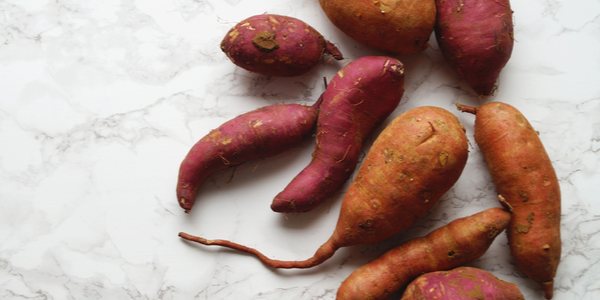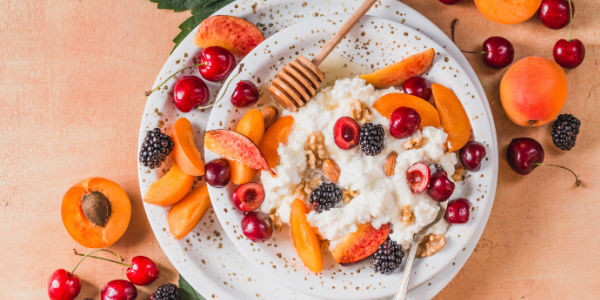
Potatoes are a beloved staple in many parts of the world including in the USA. In fact, it is estimated that Americans eat about 119 pounds of potatoes per year ( ∼1 medium potato a day) and potatoes are the number four source of polyphenol antioxidants in the U.S. diet!
While potatoes are widely consumed, they can also get a bad rap as a taboo food for weight loss. Are potatoes a healthy addition to meals, and is one potato better for health than the other? Sweet potatoes can sometimes be seen as healthier, but is this warranted?
The white potato and the sweet potato have both health benefits, similarities, and differences. Read on to find out all about the two potato varieties and their impacts on weight and health.
Sweet Potato vs White Potato
Sweet and white potatoes are both root vegetables, veggies that tend to store a large amount of carbohydrates. So, do they vary nutritionally?
The chart below details how sweet potatoes and white potatoes stack up based on a 100-gram serving.
Calories
Fat (g)
Carb (g)
Fiber (g)
Protein (g)
Potassium (mg)
Vitamin C
Iron
White Potato
93
0
21
2.2
2.5
15% Daily Value (DV)
1.2% DV
Sweet Potato
86
0
20
3
1.6
9% DV
4% DV
Of course frying a potato, like with French fries or chips, will alter the nutritional profile of potatoes. Therefore, comparing the nutrition and health benefits of potatoes to various potato products will show many different nutrients.
Are Sweet Potatoes Healthier than Regular Potatoes?
There are many similarities between the two potatoes including calories, fat, carbohydrates, fiber, and protein amount. Mineral and vitamin content are similar as well, but both the white and sweet potatoes are higher in certain nutrients. Therefore, overall, the two types of potatoes are equal nutritionally.
For example, the white potato is higher in potassium and iron, but the sweet potato is higher in vitamin C. Sweet potatoes, with the vibrant orange flesh, also provide a high amount of beta carotene, a form of antioxidant vitamin A. However, the white potato also is a good source of antioxidants as well.
Instead of thinking about these potatoes as either-or, it can be beneficial to enjoy both types of potatoes in the diet to benefit from their nutritional merits.
Sweet Potatoes vs Potato Varieties for Weight Loss
Potatoes are notorious for being high in carbohydrates, and both types of potatoes are also considered a high glycemic index (GI) food. Foods that are high GI may spike blood sugar after eating, depending on how much of the high GI food is eaten. This is the main reason why some consider potatoes a "fattening" food or a taboo for weight loss.
However, studies have shown the consumption of whole potatoes as part of a balanced, low-fat diet, as opposed to its usual form of French fries or potato chips, could potentially lead to the prevention of certain chronic diseases such as type 2 diabetes and cardiovascular diseases.
Do potatoes hinder weight loss? Studies looking at potato's impact on weight regulation are mixed. According to a 2016 review, some studies support a protective effect of potato consumption in weight management and diabetes, while other studies demonstrate no effect. A few studies suggest a negative effect.
As with any single food, the impact potatoes may have on weight regulation needs to be taken into the context of the whole diet and other lifestyle factors. Also keep in mind, that the way a roasted white or sweet potato impacts the body will be different than a bag of chips or an order of French fries.
Portion size, as well as what else is being eaten with potatoes, also plays a role in how the body digests and uses potatoes for energy.
Ways to Use White and Sweet Potatoes
Choosing to cook white and sweet potatoes instead of consuming potatoes like chips, fries, or processed foods can provide the health benefits of potatoes without added fat and preservatives.
Sweet potatoes will offer a slightly sweeter flavor, but they still are a versatile ingredient for many savory recipes. There are many unique ways to cook with both sweet potatoes and white potatoes that can be both healthy and delicious!
• Both sweet and white potatoes can be roasted in the oven with various seasonings to make healthier, baked fries either in the oven or air fryer.
• Lower fat content with a mayo-less potato salad.
• Vary up the sizing and texture of potatoes by roasting fingerling potatoes.
• Firing up the grill? Make grilled potatoes!
In Conclusion on Sweet Potatoes vs White Potatoes
As a higher carbohydrate food, potatoes can get a bad rap as harmful for weight loss. However, both white and sweet potatoes can provide many health benefits!
Both are low in calories and fat and a good source of fiber, vitamins, and minerals. White potatoes are slightly higher in potassium and vitamin C, but sweet potatoes are much higher in vitamin A.
Using fresh potatoes in a variety of ways instead of getting potatoes through pre-made fries, chips, etc. can offer the most nutritional benefits. Potatoes can be made into homemade oven-roasted fries, put on the grill, potato salad, or baked whole.
Experiment with trying different cooking methods with potatoes to add variety and reap their many health benefits!
References:
Vinson JA, Demkosky CA, Navarre DA, Smyda MA. High-antioxidant potatoes: acute in vivo antioxidant source and hypotensive agent in humans after supplementation to hypertensive subjects. J Agric Food Chem. 2012 Jul 11;60(27):6749-54. doi: 10.1021/jf2045262. Epub 2012 Feb 6. PMID: 22224463.
Visvanathan R, Jayathilake C, Chaminda Jayawardana B, Liyanage R. Health-beneficial properties of potato and compounds of interest. J Sci Food Agric. 2016 Dec;96(15):4850-4860. doi: 10.1002/jsfa.7848. Epub 2016 Jul 7. PMID: 27301296.







